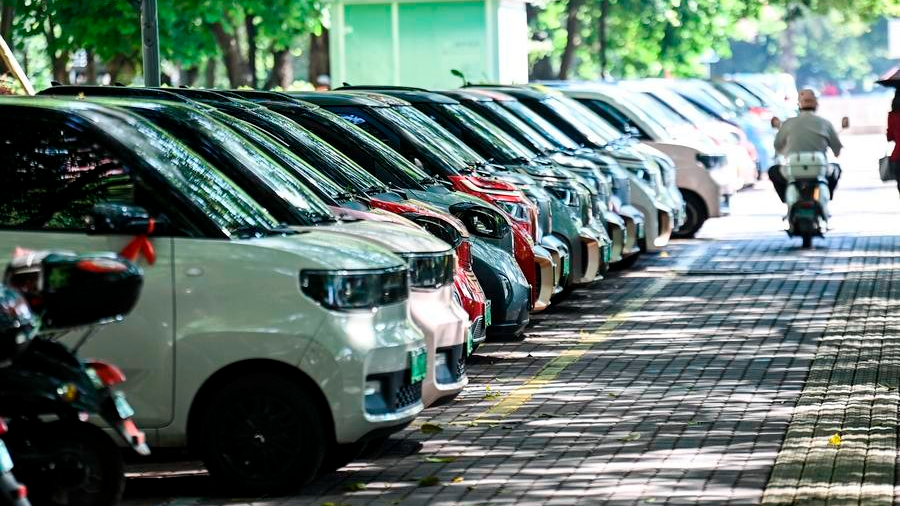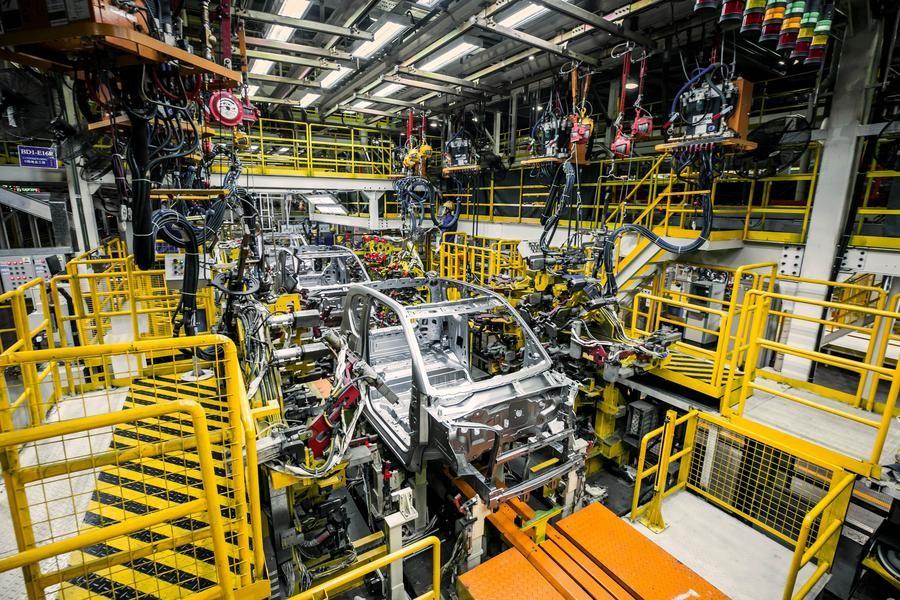
This photo taken on October 16, 2023 shows a parking lot designated for new energy vehicles in Liuzhou, south China's Guangxi Zhuang Autonomous Region. [Photo/Xinhua]
By Xin Ping
A tale of two cities
Liuzhou, a town of around four million people in south China's Guangxi Zhuang Autonomous Region, has always had a low profile until its local specialty rice noodles, called luosifen in Chinese, went viral as one of the hottest food trends in China. In addition to its food, Liuzhou's new energy vehicle (NEV) sector is also attracting nationwide and even worldwide attention.
Thanks to local carmakers, such as Wuling Motors, abundant battery charging stations, discounted parking lots and preferential policies for buyers, Liuzhou has become a city of electric vehicles. According to official statistics, in 2023 alone, 477,000 automobiles powered by new energy rolled off production lines in Liuzhou, 17 percent of the vehicles owned by its residents were NEVs, and the penetration rate exceeded 50 percent. With its stunning success in electrified car production and sale, Liuzhou is now an epitome of how China is making advances in the NEV era.
Across the Atlantic and one hemisphere away, the city of Detroit in America's Rust Belt is often seen as a symbol of decline and de-industrialization. Unlike the thriving Liuzhou, Detroit has long been beset by sluggish growth, a declining population and worsening environment. Recently, Kevin Williams, an automotive industry journalist, spent a week at the Beijing Auto Show. Guess what's his takeaway after driving more than a dozen Chinese-made cars? – "Western automakers are cooked."
A greener future
A front-runner in the latest industrial revolution, China, with its competitiveness in NEVs, is perceived as a threat to the traditional industry led by automotive powerhouses like Detroit. But if you take a closer look at facts, the growth of NEVs and other clean energy products in China is the corollary to an increasingly popular new lifestyle that generates enormous demand for low-cost, reliable vehicles powered by clean energy.
As the world pivots towards a greener future, some countries need to think twice whether protectionism or an open market can help more people benefit from clean energy technologies.
Here is an example. Unlike China's experience in growing the NEV sector, it took the West decades to make vehicles affordable for ordinary people. Take the famous U.S. brand Ford as an example. In 1909, its Model T initially cost about $825 (roughly $24,000 today) each and production was low. After machinery was widely used and automated production became the norm, the vehicle finally reached a more reasonable price of $260 in 1925.
Thanks to mass production and favorable market environment, the price cuts on NEV models in the first quarter of 2024 are equivalent to 60 percent of the cuts seen in entire 2023 and equal to those in 2022. Companies want to do lucrative business, but as the electric vehicle market becomes a battleground for automotive supremacy, carmakers and governments need to keep in mind the planet and collective welfare of the people.

This undated file photo shows an assembly line of SAIC-GM-Wuling in Liuzhou, south China's Guangxi Zhuang Autonomous Region. [Photo/Xinhua]
A 'might-equals-right' strategy
Taking into consideration the important role that Chinese NEVs could play globally in the near future, it is not hard to understand the real reason why the U.S. has hiked tariffs on them, together with solar panel and other clean energy exports. A "Chinese overcapacity" narrative has been hyped up by Washington at a time when election politics is driving some American politicians to China bashing.
However, these moves are more of a "stress reaction" in response to American carmakers' shrinking market share. "What's excessive is not China's capacity, but America's anxiety," said Yang Tao, the director-general overseeing China-U.S. ties at the Chinese Foreign Ministry, at a media briefing earlier this year.
When asked about whether China is subsidizing more than the U.S., given the investments in the CHIPS Act and the infrastructure sector, U.S. Treasury Secretary Janet Yellen in an interview with Marketplace admitted that the U.S. government is "very explicitly subsidizing investments in these important strategic areas. And what we don't want to see is massive Chinese subsidies to firms with huge overcapacity that will just drive our firms out of business."
There's a Chinese saying for that logic, "The magistrate allows himself to set fire but bans everyone else from lighting candles." Or, to use an English equivalent, "Do as I say, not as I do." The U.S. is essentially using the "overcapacity" narrative to kneecap other countries' strong industries and practice protectionism and trample on market principles and international trade rules in the name of "fair competition." This is nothing but bullying.
Detroit has witnessed too much of the rise and fall of America's car-making industry. The Big Three – Ford, General Motors, and Stellantis – used to be automotive titans with little to none efficient competition. With the rise of Chinese and other brands, consumers are the ones to gain as they can choose more freely, and at a lower price, from more new and high-quality models.
However, if countries follow the old path of protectionism and exclusionism, another trade war could be brewing and that spells disaster for all countries concerned and the global economy as a whole. Those who are keen to take politically driven steps to serve election campaigns may run the risk of pushing everyone to the brink.
Xin Ping is a commentator on international affairs, writing regularly for Xinhua News, CGTN, Global Times, China Daily, etc.

 中文
中文



